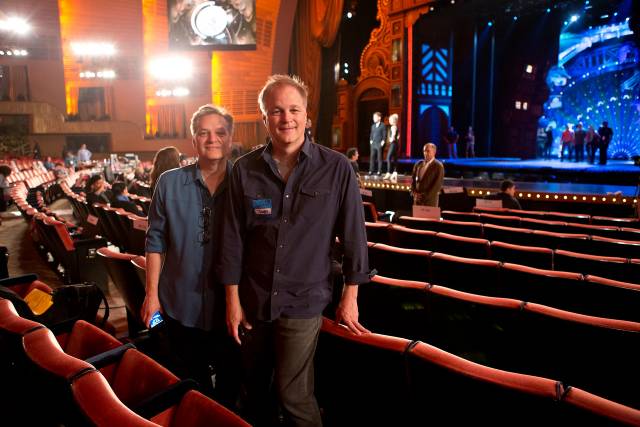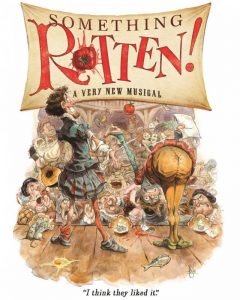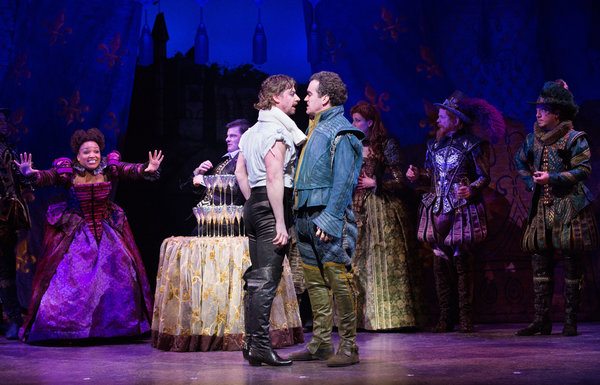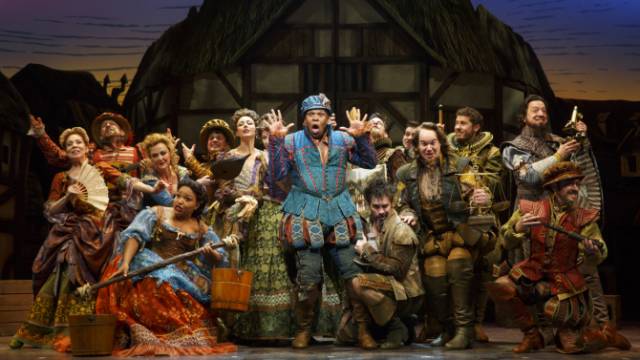

By now it’s common knowledge that brothers Wayne and Karey Kirkpatrick achieved the unthinkable by having their very first musical skip out-of-town previews and open successfully on Broadway in the spring of 2015. Something Rotten! was one of the only musicals in recent memory to have opened without the benefit of being the adaptation of a well known property. The musical centers on the relationship between the Bottom brothers, Nick (Brian d’Arcy James) and Nigel (John Cariani) who are hard at work trying to write a show that will be as popular as those written by a certain William Shakespeare (Christian Borle). When a soothsayer (Brad Oscar) predicts “musicals” will be big in the future, the Bottom brothers believe they might be on the brink of glory.
Something Rotten! became an instant sensation that went on to earn ten Tony Award nominations, and a win for Borle in the Best Featured Actor in a Musical category. By catering to lovers of musical theatre, parodies and Shakespeare alike, the show is one of those rare beasts that “has something for everyone”. In fact it’s so well constructed, and delightful to watch, that it’s easy to take its individual parts for granted, something which is noticeable in the Original Cast Recording which efficiently delivers the story without the “bonus” of visuals. On the eve of the album’s digital release we spoke to Wayne and Karey Kirkpatrick who shared stories about the making of the musical.
You both ended up becoming artists, was the Kirkpatrick family upbringing very Von Trapp?
Karey: Yes and no, we also have a younger brother who is a singer/songwriter. Growing up in a church environment we learned to play the guitar, we were all in bands, not the same ones, but music was always a big part of our lives.
With your father becoming a preacher how did church music influence you?
Wayne: Growing up in the mid-70s we were surrounded by that kind of music as well as others like black gospel and soul, artists like Andraé Crouch who was kinda big at the time. Also, there was a heavy dose of contemporary music that would be considered Christian because of the lyrics, but the music styles were pop. I had those influences and I also listened to the radio all the time, I had a steady dose of influence from pop radio. It was a nice eclectic exposure to a lot of different types of music.
 I always find it fascinating how so many people who do theatre first started becoming interested in music through church.
I always find it fascinating how so many people who do theatre first started becoming interested in music through church.
Karey: Church and also the high school musical! There are a lot of people who have musical aspirations and in church you can get the most accepting you’ll ever find, usually, and try your music skills. A lot of Wayne’s early songwriting was first tested in front of a church audience, and eventually he was surprised to realize how many theatre people were fans of his early songwriting work with artists like Amy Grant.
Speaking of eclectic, the show is essentially a pastiche of genres, however it doesn’t feel like a mixtape, it’s a very cohesive show by the end. Was it easy to rein in all of these different elements and find the show in the middle of this?
Wayne: That’s a nice compliment because actually I wondered that along the way because there were so many different types of music that it could feel like a schizophrenic show, but I think what happened is that we started figuring out the voice of each character. For example we had Shakespeare the rock star, so it made sense for his songs to be more pop-rock, as opposed to when Nostradamus sings about musicals, it needs to be musical theatre. The further we went along with the show, the more the different types of music made sense with the story we were telling. On the writing side of it, it was a lot of fun to be able to stretch and play with all those different styles of music. Unfortunately I don’t know what made it tie up all together like you said, I guess when we wrote it there was some sort of thread that appeared and grounded it.
Do you subscribe to those conspiracy theories about Shakespeare not being the author of his works?
Karey: It depends on which one of us you ask, John O’Farrell, my co-book writer, does not believe that and actually finds it a little bit classist to think that many people think Shakespeare couldn’t have written all that because he never traveled anywhere and had no formal education. I do kinda wonder if he wrote everything, because the history around him is so sketchy, but I also think the conspiracies are fun and full of drama, also the competitor in me doesn’t want to believe that one guy wrote all that.
Wayne: When we were doing research we ran into a lot of theories people have about that and I have to believe that somewhere along the way because of the nature of his celebrity and his body of work, that possibly something here and there he got credited for that maybe he didn’t write. That’s strictly an uneducated speculation, but just if you see the way history can tend to be rewritten by the winners, you’d think somewhere along the way there must be some form of the Bottom brothers who went “hey, wait a minute…”
Regardless of whether he wrote them or not, Shakespeare’s works are brilliant and there is something very humble about the show, which is that you give Shakespeare’s sonnets an opportunity to shine in their own right. Not that he needs any more attention obviously…
Wayne: (Laughs) Right, he gets good press.
Was it intimidating to add music to the Bard?
Wayne: I think the whole spirit of the musical, whether we’re talking about musicals or Shakespeare, is that there’s a certain amount of appreciation for everything, and because you love it you can also poke fun at it when it gets a little too full of itself. It’s all in good fun and I think if we were writers who absolutely hated musical theatre and Shakespeare it would be very mean spirited, and we are not like that, we have great admiration for our subjects.
Karey: Our original idea was always that in the writing team, the most insecure of the two was actually Shakespeare. One of our earliest ideas was that the character would keep saying things and Shakespeare would take notes and go “oh, good line”. Something like Shakespeare’s greatest hits, and we would Google things like “most famous lines from Hamlet”, and it’s funny because now wherever they sell Shakespeare themed gifts they put famous lines on mugs or t-shirts. It was great to have all this material to draw from, especially because they’re in the public domain.
When you wrote “It’s a Musical”, did you sit down and say to yourselves “hey, let’s write a showstopper!”?
Wayne: No, I don’t think we were consciously trying to create a showstopper, we were just trying to get our point across in the most entertaining and comedic way possible. I don’t think you can successfully set the goal of creating a showstopper (laughs). The goal in writing these songs was always to do something catchy, hummable, and telling the story that we were trying to tell. Those were the main criteria and seeing how it served the story.

Karey, this isn’t the first time you’ve adapted beloved properties, you adapted Charlotte’s Web and The Hitchhiker’s Guide to the Galaxy for the movies. Can you talk about the process of making adaptations?
Karey: It was frustrating to not be able to use more of Douglas Adams’ book, but we tried to use the best of it. I’ve done a lot of adaptations over the years, so it’s not a foreign process to me. It was fun to do a song like “Will Power” and grab sonnets and soliloquies from his plays and do a song with them, it was like having The Beatles’ catalogue.
You’ve mostly written comedies and animated films, which tend to be considered light entertainment in Hollywood, but if you think about it Something Rotten! for instance might make people interested in Shakespeare in a way film adaptations of the tragedies don’t. Can you comment on this genre bias?
Karey: Ironically I got into animation because of my love of musical theatre. When I was at film school I wanted to write a musical and I asked a guy how to get paid for writing a musical and he said “Disney animation”. So we came up with an idea for an animated movie and pitched it to them. They didn’t like the movie, but they liked the talent so we got hired as staff writers, so I wrote The Rescuers Down Under during that time. Once you’ve written one or two animated movies, it’s such a unique process that you become a valuable commodity in that world, so that led to James and the Giant Peach and others. The animation I grew up loving was because of the songs, movies like Pinocchio, Lady and the Tramp...I grew up on the Sherman brothers, so weirdly that’s how I got into animation, once I was into it I realized that the mythic story structure that exists in animation is some of the most powerful storytelling out there, because you’re reaching such a wide audience. You’re essentially telling social allegories, animated movies are the modern day Aesop fables, while you’re trying to entertain adults, the kids who go see animated movies learn about how to live their lives. Movies like Toy Story are as much about being a parent, as much as about being forgotten, which are things kids can relate to. Shrek taps into the majority of people’s feelings of being unlovable and having people never see beyond their exterior...so I think these movies get overlooked as not being “serious”. You’ll find no better piece of filmmaking than the opening sequence of Up, in terms of economy in storytelling and evoking emotions.
One of my favorite things about the show was the advertising campaign featuring animated characters, Karey, since you’ve specialized in animation, will we maybe see these characters come to life and maybe do songs that were cut from the show?
Karey: Hmm, that never crossed my mind. But it’s a possibility I guess? Part of that brilliance was [producer] Kevin McCollum’s idea to use these characters to get a conversation started. These characters were coming out of nowhere, we skipped out of town and came straight to Broadway with a show nobody knew anything about, with a title that could be off putting and Kevin wanted to get a conversation started about people in New York who loved theatre, so he went to Peter de Sève, who is a cartoonist for The New Yorker and that kinda sums up the kind of show this is, a satire. It’s not like any other theatre marketing campaign out there.
Since this is a show about the creative process and you’re two siblings writing about two siblings, is it safe to assume that there are elements of yourselves in the Bottom brothers? For example, did your own process affect the way you were writing about Nick and Nigel’s attempts at writing a show?
Wayne: Yeah, I think on some level definitely people who are writers can relate to it. Basically anyone who’s ever tried to create something goes through similar base emotions, even the basic element of the story of just trying to get one thing and you’re against whoever is the Shakespeare of the time, people who seem to turn everything they touch into gold. So as a struggling writer you think “I don’t want it all, I just want a little piece of that, something that’ll put me on the map”. In terms of our own experiences we’ve had that in our own respective fields, and the way in which we approach that process individually is reflected in some of the Bottom brothers’ personality traits.
Karey: People who know us obviously know which one’s which...when we first started writing the show the characters weren’t brothers, they were just writing partners and then we thought it would be fun to make them siblings because it would also give us some material to draw from. There used to be a song called “The Trouble With You” where they point out each other’s flaws, going all the way back to when they were ten years old, which eventually turned into the “To Thine Own Self be True” song...

One of you is a musician and the other is a filmmaker which means more often than not, you don’t get to see people react to your work immediately in the same way you do in theatre. Can you talk about this dynamic?
Wayne: It’s instant approval or instant rejection. In my case I normally write a song by myself, you record it, you produce the record, you work on it for a few months trying to make it sound like you want and then you send it out into the world. Usually you hand it over to a label and then they try to put it on the radio, it’s a slow build, you have to check for how the sales are doing, and as a writer you don’t have a connection to the outside world that is listening to what you have created. Sometimes you might get a response, but from a writer’s standpoint, nowadays most people don’t even know who wrote the song because you can’t even read credits on anything anymore, people assume the artist wrote everything. You stay in a little bubble not knowing what people think of your work, while in theatre you write something and then 1,500 people come and see it, and you can tell immediately what they think, not only by the applause and laughter but also by listening to what people say when they’re leaving the theater after the show. The immediate response is not only gratifying if they like it, but also if you’re in previews or something, you can make fixes on the spot based on mass response. It’s great!
If you had to pick a modern day equivalent of Shakespeare in your respective fields who would it be?
Karey: Sondheim was a huge influence on me, just in terms of listening to the cast album of Sweeney Todd and his level of quality just continues to amaze. His way with language is incredible, I don’t think there’s any better lyricist out there. In terms of who we always joked was a modern day Shakespeare on Broadway, it would be Lin-Manuel Miranda who is out there creating all the stuff that is the modern day equivalent of the rhyming couplets.
Wayne: For me maybe it’d be Taylor Swift (laughs) in terms of trying to think of someone who has that kind of mass appeal and everything they do skyrockets to the top of the charts, or concert draw. Maybe she’s just on my mind because of all the stuff she’s done with Apple, I mean you gotta be pretty powerful to have that kind of influence. I don’t mean she’d be Shakespeare in terms of being my nemesis (laughs) but in terms of her popularity, she can do no wrong right now.
I think she should quit music and run for President.
Wayne: Exactly! (Laughs)
Something Rotten! Original Broadway Cast Recording is now available on iTunes.